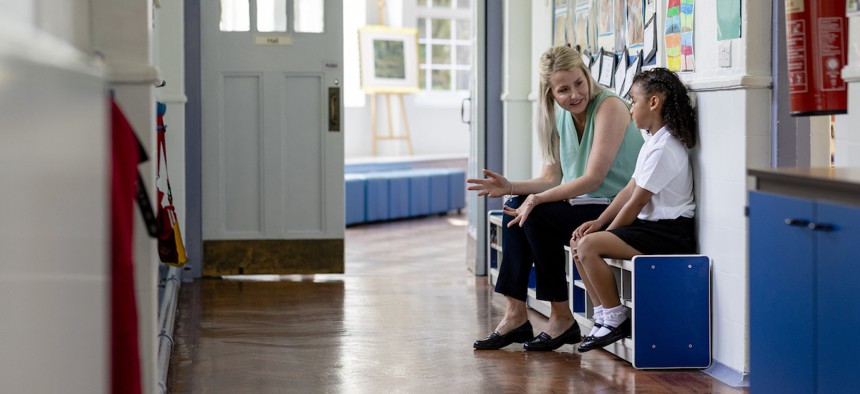Amid a youth mental health crisis, teachers get schooled

SolStock/Getty Images
Educators, who are on the front lines of the issue, are increasingly being trained in how to recognize signs of mental distress in their students.
As kids settle into the new school year, there are fresh concerns about the mental health of students. According to the Biden administration, which announced $200 million this week to support youth mental health efforts, recent data has found that nearly 1 in 5 teen girls felt persistently sad or hopeless in 2021, a nearly 60% increase over the past decade. It also found that 22% of high school students seriously considered attempting suicide during the past year.
Amid a decline in adolescents’ mental health, state and local governments are assigning homework of their own. A recent report from the National Alliance on Mental Health that looks at state-level legislative trends on the topic found that last year a number of states proposed legislation to train school staff on how to recognize signs of mental distress in their students.
California, for instance, passed a bill to support suicide awareness and prevention training for teachers, and West Virginia’s governor signed law requiring schools to offer eating disorder and self-harm training for teachers and students. Kentucky, meanwhile, enacted legislation that requires school counselors or school-based mental health service providers to offer administrators, teachers, and other staff training and assistance on recognizing symptoms of mental health among students.
Local governments are also supporting mental health training programs.
In Kansas, the Johnson County Mental Health Center is helping to train public school teachers in the city of Olathe to recognize and address students showing signs of a mental health condition. Earlier this year, the center was awarded a nearly $500,000 grant from the Substance Abuse and Mental Health Services Administration to support a 4-year program that aims to train educators on how to approach students about mental health and direct them to appropriate community resources, such as the county’s crisis hotline, for further treatment.
In Olathe, officials are seeing “increasing numbers of anxiety and depression among young people,” said Sarah Haupt, community engagement coordinator at the Johnson County Mental Health Center. Plus, more adolescents are being exposed to substance use like vaping or marijuana, which have been linked to symptoms of anxiety, depression and suicidal thoughts.
That’s why training educators is a crucial part in reducing mental health crises, as early intervention from teachers can help “students [get] connected to care quicker … before the problem gets more escalated,” said Angie Salava, director of mental health for Olathe Public Schools.
The first round of training occurred this summer, Haupt said, and about 160 teachers participated in the voluntary program. Trainees followed curriculum from the Mental Health First Aid program, an interactive course from the National Council for Mental Wellbeing that teaches participants how to identify and respond to signs of mental health illness through online and in-person sessions. For example, teachers learned active listening skills, such as maintaining eye contact or refraining from interrupting someone else while they’re talking, and familiarized themselves with the program’s 5-step action plan for offering students mental health support, Haupt said.
Data from the first seven sessions showed that before the program, only 22% of participants said their knowledge on how to recognize signs and symptoms of mental health problems were high or moderate, compared with 97% after course completion, she said. And 64% of participants reported they felt confident in their ability to get a student connected to care after the course, compared to 35% beforehand.
Training teachers on mental health is gaining traction outside of Kansas, too.
Pender County, North Carolina, rolled out a new mental health plan that provides school staff training. In Florida, Miami-Dade County teachers received training at an annual conference, where attendees learned how to spot warning signs of mental health crises in students. And five Georgia counties are working with Kennesaw State University faculty to provide teachers and school resource officers with intervention training twice a year, under a $4.45 million grant from the U.S. Department of Education.
“Arming [teachers] with this little bit of knowledge … can really be a protective factor in a child’s life,” Haupt said.







